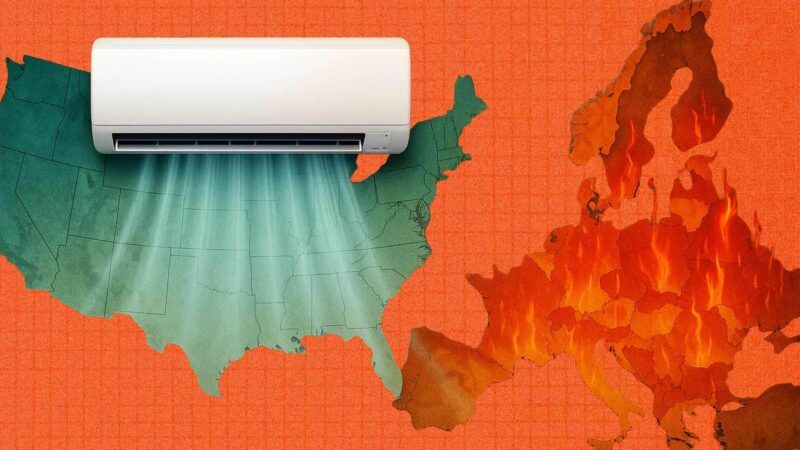Environmental Regulations Are Literally Baking Europeans to Death
Europe’s lower GDP, higher electricity prices, and strict environmental regulations impede the use of air conditioning, contributing to the continent’s annual 175,000 heat-related deaths.

Much of the U.S. has been suffering a sweltering heat wave for the past two weeks. Though uncomfortable, particularly in areas with nearly 100 percent humidity like Washington, D.C., most Americans experience heat waves as a sweaty annoyance. Our European counterparts are not so fortunate, thanks to excessive regulations driving up the price of energy and outright banning certain air conditioning units.
The National Oceanic and Atmospheric Administration put 130 million Americans "under extreme heat warnings or heat advisories [last] Thursday…with 282 locations breaking daily heat records," according to The Guardian. CNN reported that at least one death in the St. Louis area was ascribed to the heat wave, but mass casualties have not been suffered stateside. Meanwhile, in Europe, eight people have died across the continent as of Wednesday: four in Spain (two were killed in a wildfire that is believed to be driven by hot, dry conditions), two in France, and two more in Italy, per Al Jazeera.
The situation was even worse during the summer of 2023. The U.K. Health Security Agency estimated that 2,295 deaths were associated with excessive heat. The U.S., meanwhile, recorded nearly the same number of heat-related deaths (2,325), despite having a population (335 million) nearly five times greater than the U.K. population (68 million) at the time.
The United Nations estimates that the European continent accounted for approximately 175,000 heat-related deaths annually between 2000 and 2019. The Environmental Protection Agency, meanwhile, calculates that about 1,300 deaths per year in the U.S. are due to extreme heat. (This translates to four heat-related deaths per million annually in the U.S. and 235 heat-related deaths per million annually across Europe.)
There are myriad reasons why there are so many more heat-related deaths in Europe than there are in the United States. But the most significant explanation might just be the simplest: air conditioning.
David S. Jones, a physician and historian at Harvard University, told CNN in 2023 that the disparity is explained by some combination of the U.S. underreporting its numbers and heat being more lethal in Europe due to the lack of air conditioning. The American-European disparity along this latter dimension could hardly be greater: nearly 90 percent of U.S. households have air conditioning, whereas less than 10 percent of European homes do. The productivity gap between the U.S. and Europe helps explain this disparity.
A new study published in the Journal of Environmental Economics and Management explains that "air conditioning ownership increases households' electricity consumption by 36% on average globally." The study also found that "compared to the other drivers of electricity consumption, air conditioning has the leading marginal effect, also accounting for a significant share of household budgets." In 2023, the average retail price of electricity in the United States was about $0.13 per kilowatt-hour, according to the U.S. Energy Information Administration data. In Europe, the price of electricity was roughly three times higher at $0.34 (0.2872 euros), according to Eurostat data.
Air conditioning markedly increases household electricity consumption, electricity is more expensive throughout Europe, and Europeans are poorer. American gross domestic product (GDP) per capita was $85,810 in 2024, while the European Union's GDP per capita was 27 percent lower ($62,434), per World Bank data.
Aggressive environmental targets are also making Europe hotter. Under its Green Deal, the European Commission imposes strict air pollution regulations for heating and cooling and mandates that new buildings be non-greenhouse gas (GHG) emitting. The commission's Fit for 55 package, meanwhile, legally requires the European Union to reduce carbon dioxide emissions by at least 55 percent by 2030. (The energy that powers air conditioning accounts for approximately 1 percent of global GHG emissions.)
To achieve these environmental goals, the commission encourages its citizens to use comfort fans, which "can make a good job at refreshing you while consuming much less energy than air conditioners." If someone were to purchase an A.C. unit, the commission cautions people to "be sure to choose one with the proper capacity and highest efficiency, don't oversize it." Italy, Greece, and Spain even announced temperature limits in public spaces during the 2022 heatwave in an effort to meet these environmental objectives.
Although the U.K. is no longer part of the European Union and is not subject to its environmental targets and associated regulations, it has its own red tape that makes installing air conditioning harder than it needs to be. Richard Salmon, director of the U.K.-based Air Conditioning Company, told CNN that "authorities will often reject applications to install AC 'on the basis of the visual appearance of the outdoor condenser unit.'" Apparently, aesthetics are more important than human well-being in the United Kingdom.
Of course, the lack of A.C. in Europe is also cultural—Mother Jones reports that two-thirds of French people surveyed in a 2021 OpinionWay poll said they did not plan on purchasing an air conditioner due to energy costs and environmental impacts. Still, Europe's stringent economic and environmental regulations are making air conditioners more expensive and less used, which is needlessly jeopardizing human lives.


Show Comments (74)